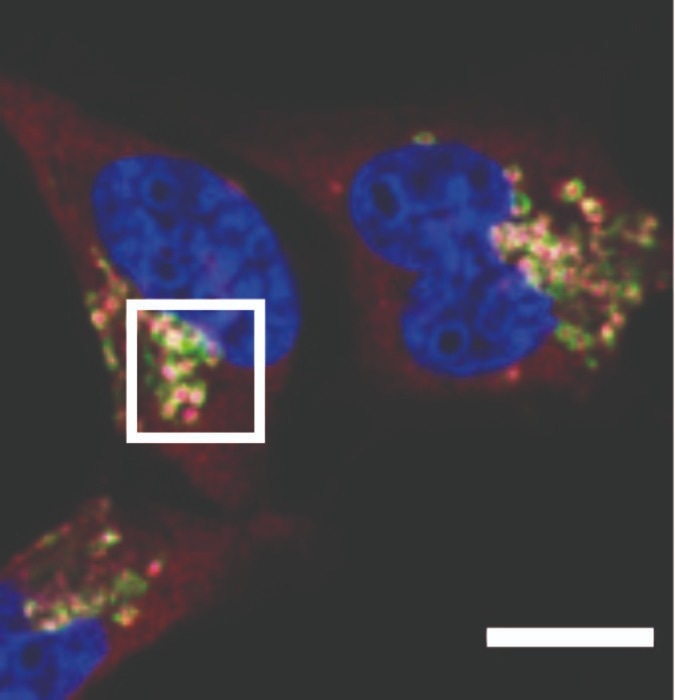An intracellular sensor that tracks the quality of so-called MHC-I molecules which aid the immune system in identifying and eliminating dangerous cells, including tumor cells has been discovered by a global team headed by Goethe University Frankfurt.
 Cells: Once the cells quality control mechanism is activated, IRGQ (red) accumulates in special cell organelles, the lsysosomes (green). This is also where the degradation of the non-functional MHC-I molecules takes place. Image Credit: Dr. Lina Herhaus, Goethe University Frankfurt
Cells: Once the cells quality control mechanism is activated, IRGQ (red) accumulates in special cell organelles, the lsysosomes (green). This is also where the degradation of the non-functional MHC-I molecules takes place. Image Credit: Dr. Lina Herhaus, Goethe University Frankfurt
The sensor guarantees that defective MHC-I molecules will stay inside the cell, where they will eventually disintegrate. Unexpectedly, if this quality control is not followed, more MHC-I molecules may make it to the surface of cancer cells, strengthening the immune response against the tumor.
Because cells display portions of nearly every protein they contain on their surface, it is quite simple to determine the health of a cell. This implies that the immune system can tell right away if a cell has been mutated to cause harmful changes or infected by a virus.
These fragments are presented by countless molecular “radio masts,” or MHC-I molecules. After being put together inside the cell, they are moved to the membrane, which is the lipid layer that envelops the cell. In this case, the masts are secured such that the cargo faces the outside and is visible to immune system troops that are continuously roving the body.
These soldiers eliminate the offending cell if they see dangerous compounds shown on the MHC-I radio towers. The masts themselves must, however, be completely operational; otherwise, there is a chance that this mechanism would not function, and dangerous cells will evade the immune system.
We have now discovered a sensor inside the cell that ensures that only functional MHC-I molecules are transported to the plasma membrane, while the defective units are eliminated.”
Dr. Lina Herhaus, Study Corresponding Author, Goethe University
Lina Herhaus carried out studies on this subject in the Institute of Biochemistry II at Goethe University. Currently, he is in charge of an independent research team at the Helmholtz Centre for Infection Research in Braunschweig.
Cells constantly create a large number of proteins to perform their many different tasks. If mistakes are made during this procedure, the impacted molecules are often removed. Defective proteins are identified by specialized receptors and sent to tiny trash bags for breakdown.
As part of our study, we searched for yet unknown receptors and came across a protein called IRGQ, which is specifically responsible for ensuring the quality control of the MHC-I radio masts.”
Dr. Lina Herhaus, Study Corresponding Author, Goethe University
The researchers employed genetic interference to inhibit IRGQ synthesis. As a result, malfunctioning radio masts gathered in the cells, along with their functional counterparts, some of which were also integrated into the cell membrane.
You would expect cells without IRGQ to trigger a weaker immune response. However, this is obviously not the case: Having analyzed various human tumors, we found that less IRGQ was associated with a better survival rate of patients with liver cancer.”
Ivan Đikić, Study Co-Lead, Institute of Biochemistry II, Goethe University
Additionally, the patient data was validated in a mouse model of experimental liver cancer: IRGQ-deficient rats had a much longer survival time from cancer because their immune systems targeted tumor cells much more vigorously.
At least for liver cell carcinomas, the second most lethal kind of cancer in the world, IRGQ may serve as a target structure for novel medications.
Đikić emphasized, “We have found a new mechanism by which tumor cells evade the immune system. In further studies, we will now examine IRGQ's influence on other types of cancer. Our findings could be used in the future to develop new therapies for liver cancer. One example would be to use drugs to target IRGQ for degradation and thereby stimulate the immune response against the cancer.”
Regardless, the recently identified mechanism is also intriguing for fundamental studies.
Herhaus said, “We want to find out how important IRGQ is for the functioning of the immune system in general, including during viral infections. The results of our study raise a whole series of interesting questions, the answers to which can deepen our understanding of the body's immune defense.”
Source:
Journal reference:
Herhaus, L., et al. (2024) IRGQ-mediated autophagy in MHC class I quality control promotes tumor immune evasion. Cell. doi.org/10.1016/j.cell.2024.09.048.